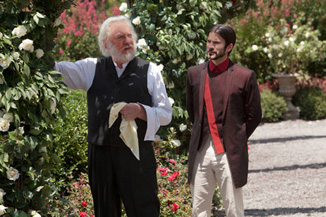Book vs. Movie: The Hunger Games
By Russ Bickerstaff
March 28, 2012
Sadly, as the novel progresses, Collins doesn’t seem to be putting a whole lot of effort into making the premise seem at all plausible. In the “real world,” there isn’t a whole lot of precedence for a totalitarian government using lethal televised games to squelch any idea about people rising up against it. That sort of thing would probably only make people angrier. People are very, very protective of their children. Any society that would ignore that basic instinct towards preservation of children to the degree that its found in Collins’ book would be fundamentally different from our own - which would be an interesting concept to read about if Collins wanted to explore it, but she does not.
We do, however, have some precedence for this kind of treatment of children. It has more to do with necessity, though. Children were treated like machines during the dawn of the industrial revolution. Back then, they were very, very cheap and docile labor for a system of control that helped build our country. So, why wouldn’t they be used for labor to rebuild our country? And in more violent milieus like the diamond mining cultures of Africa, children are given guns and used as disposable soldiers. But gladiatorial death games? That seems a little unlikely. Not that it’s entirely implausible, but as mentioned earlier, Collins doesn’t seem terribly interested in making the premise seem plausible.
Complete ambivalence towards plausibility can make for some pretty brilliant writing under the right circumstances. One of my favorite authors, Philip K. Dick, was a master at it. For example: A man has an argument with the AI in his car about whether or not he’s sober enough to drive. For another: There’s a world where technology runs on prayer. Neither of these is at all plausible, but they’re clever enough to make up for it. Mark Leyner writes stuff that becomes fascinating by virtue of its implausibility. (Visceral tattoos? Somehow the idea just works.) Collins doesn’t attempt to make the implausibility very compelling, though, choosing instead to focus the story on the protagonist - Katniss. She’s a 16-year-old who is forced to be more responsible than anyone else in her family for various reasons. She’s a character who appeals to any kid who is about to hit the age where one feels the weight of the world on his or her shoulders. I’m willing to bet THAT is where the appeal of the book truly lies. (Well, that and marketing.)
People can comment on the topicality of the book in the current economic climate. There is a disparity between the wealthy and the poor - controlling and the controlled that bleeds out of the corners of the novel. This book only covers the bigger issues tangentially to a very derivative action-movie-style plot that has garnered a huge following. So how does the book compare to the actual action movie that’s based on it?
The Movie
The feel and pacing of the book arevery cinematic and action-oriented. As the idea was allegedly inspired by visuals on TV, it would seem to be a natural fit for cinema. And as the central draw of the story seems to be a powerful teenager, the film may be able to tap into a character-driven story with more immediacy than an uninspired prose style can deliver to the page.
In the early going, the film doesn’t seem to be all at interested in keeping any ort of rhythm or pacing. There’s a kind of stillness about it that feels very much as though it’s coming from an entirely different period of filmmaking. The Appalachia of the District 12 setting feels a lot more like a particularly dark episode of Little House on the Prairie than anything. As bits of the bigger society beyond the protagonist’s home district begin to seep-in, we begin to get the feel of a production design, which feels very much like ‘70s sci-fi with brief glimpses of the ‘80s. We get kind of a mix of THX-1138 and Kubrick’s A Clockwork Orange by way of Gilliam’s Brazil. It all feels kind of outdated - an earlier vintage a dark future than we’ve been exposed to in popular format in recent years.
Continued:
1
2
3




